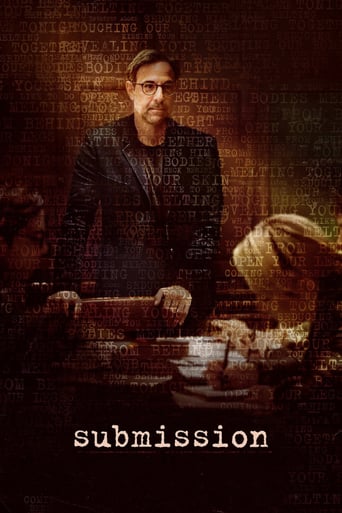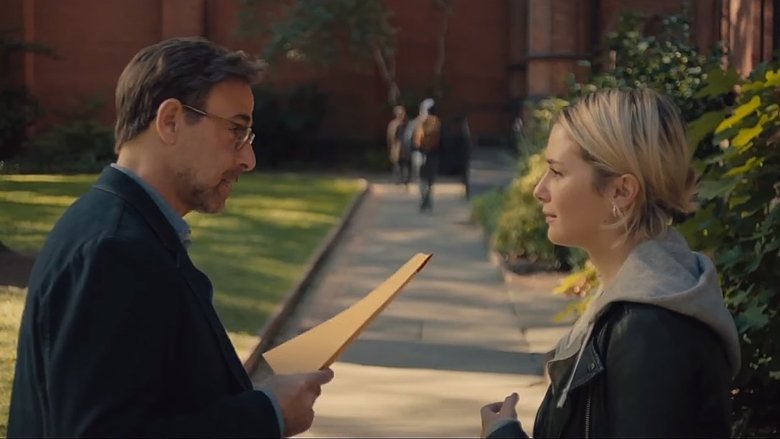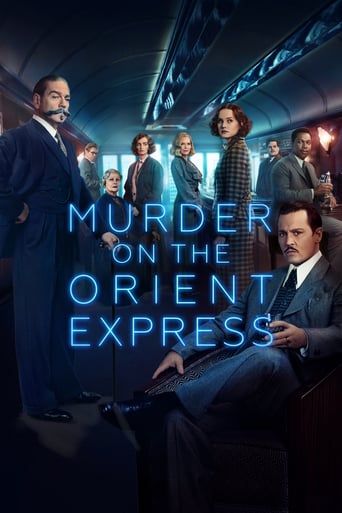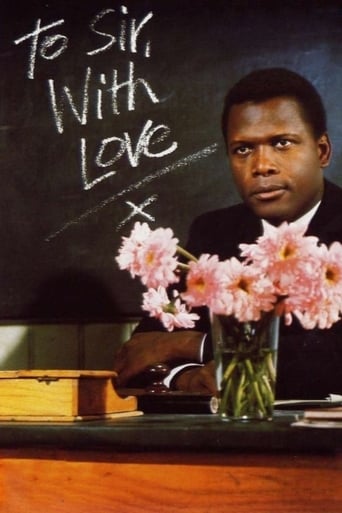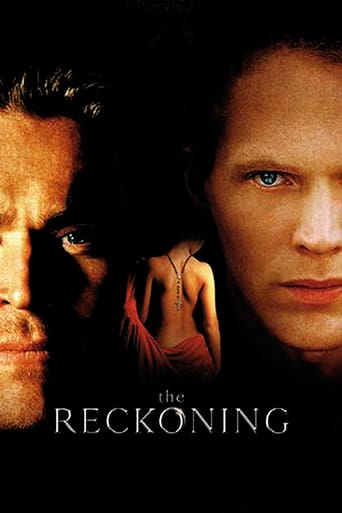Submission (2018)
A well-respected professor who is a celebrated novelist and loving husband loses himself when he becomes obsessed with an ambitious and talented student.
Watch Trailer
Cast


Similar titles
Reviews
I don't normally write reviews here. Actually, the last (and only) one was for a film I was in. Somehow, this was different. Not mind-blowing or illuminating or even that great. But let me get into it."Submission" is the story of Ted Swenson (Stanley Tucci), a novelist with a successful debut and a bad case of writer's block. So he's become a tenured Creative Writing professor at some prestigious, very English college. There's no joy or inspiration in it: his students are shallow hipsters who write about screwing dead animals and eviscerate each other incessantly; his fellow faculty members are pretentious jerks; his daughter feels ignored and resents him. At least his wife Sherrie (Kyra Sedgwick), the school nurse, loves him for who he is. But she just doesn't get his plight.Angela Argo (Addison Timlin) does. A shy, punkish student who says little and never presents her work, she tentatively approaches Swenson, whose novel is, you know, the greatest EVER, and asks for his opinion on her own - which Swenson is bowled over by. Here is someone with actual talent, with something new to say. He has to nurture it for Angela's sake, and before long he wants to nurture her as well. Never mind that certain things about her don't quite add up, or that the novel is about a young woman who has fantasies about having sex with her teacher - and acts on them.If you can't guess where this is leading, you're the perfect audience for "Submission," both a low-key drama about the precarious relationship between teacher and student, and a satire - as the source novel, Francine Prose's "Blue Angel," was - on the perils of sexual harassment on college campuses. When the book came out in 2000, it might still have been a fresh, maybe even funny concept. But in this #MeToo age, I doubt many people will be laughing. And while the drama aspect of writer-director Richard Levine's film is competent and well-acted, the satire is...well.This isn't entirely "Submission's" fault. It was filmed sometime in 2015-16 and made the festival rounds early last year, before finally getting a limited release this March. In that year gap the landscape changed in ways no one, certainly not Levine, could have expected. What does this timeliness do for the film? Not much, as it more directly connects to 90s thrillers like "Disclosure." Sexual harassment and its consequences is a running topic though "Submission," though not in ways I found all that compelling.Much of this film comes off as heavy-handed (the book could be the same, I haven't read it). Angela's novel is titled "Eggs," with obvious connotations, so of course eggs show up everywhere. A dinner conversation between Ted and his colleagues focuses on bewilderment with their students and the horrors of political correctness - in fact, nearly all his talks with other teachers are about the subject. Prose's novel was based on a 1930 German film of the same name, so Ted watches it to see the parallels with his own predicament. Satire thrives on broad strokes, and a few scenes do capitalize on this, but Levine's film is otherwise so restrained and quiet - the cinematography is unobtrusive, the score almost nonexistent - that the tones clash. His plotting, presumably faithful to the novel, is also rote; there are few twists to speak of, and while there are some dramatic stakes, they don't build until well into the second act. The film tries to be thoughtful and mocking, but can't manage both at the same time.If there's one thing that makes "Submission" worth seeing, it's the actors - particularly the three leads. Even when the film threatens to lose its way, they anchor it with quiet conviction and nuance, lending weight that would otherwise not exist.Ever since his breakout role as a mobster on "Miami Vice," Stanley Tucci has always been a reliably solid presence - unflappable, subtle and authoritative. Here, with a toupee that makes him look like Stephen Colbert and goofy scarves, his Ted is a cynic truly fed up with life's vagaries (learned through sporadic and unnecessary voiceover that Tucci delivers with perfect disdain). He desperately wants to believe he's above the establishment he's long since been swallowed up by. He peppers his language with caustic sarcasm and perfunctory laughter that fools no one. There's really not much to like about him - that resentment manifests itself as smug disdain for his peers and barely-restrained contempt for his students, and when tempted by danger he hardly resists. But Tucci shows us there's still some decency in this naive, floundering man.Kyra Sedgwick has little to do beyond playing off Tucci, but in her one big scene - a fiery condemnation of Ted after he confesses his sins - she absolutely nails it. In that moment, when all Sherrie's frustrations with her husband, which she's presumably been repressing for years, come pouring out, we understand this woman almost completely in just one scene, and it's very gratifying.And then there's Angela.I'd been aware of Addison Timlin prior to this, but she didn't seem to be someone worth paying much attention to. The fact that many of her films didn't get a wide release, or sat on a shelf for years, was part of it, but I thought of her as just another young actress. "Submission" showed me how wrong I was. I've since tried to watch more of her work, and she strikes me as a talented, confident actress who becomes more notable with each subsequent project; however, she's often let down by the varying quality of said projects, which range from low-key great, to divisive, to simply bad. There is yet to be the film or TV show that equals her talent. But she never gives any less than her best."Submission" falls firmly into the divisive category, but it's one of Timlin's strongest and most assured performances. When we meet Angela she's insecure, putting down her work and almost begging Ted to read it. In the gaudily-lit depictions of her smutty fiction, she's the vulnerable, teasing object of desire. As Ted asks for more pages her timidity gives way, bit by bit, to provocation, remaining just innocent enough that Ted doesn't - or won't - realize what he's getting into.Timlin makes this character - who as written remains largely enigmatic - truly alive. She plays early scenes with the right balance of earnestness, as Ted sees her, and something more amoral and manipulative, as everyone else sees her. While her intentions were obvious, she made me wonder when Angela was being genuine and when she was saying what Ted wanted to hear. As the temptress becomes real, Timlin sells the transition brilliantly in a pivotal scene. Even when Angela abruptly becomes colder and openly antagonistic, Timlin's conviction never wavers and she sells that transition too. Through her, I felt like I could almost understand this ruthlessly ambitious woman who believes, above all, in herself and her work. It's a tremendous performance that, again, I wish was in a film that matched her dedication."Submission" finds its heart in the interplay between Ted and Angela. What begins as a kinship between frustrated writers takes its time and is well-developed, despite some plot points that are introduced and then dropped (for one, Ted claiming Angela's work as his own to placate his inquisitive colleagues). He eats up her flattery but also genuinely likes her work, despite some troubling parallels to go with its aggressively sexual nature. It inspires him - maybe not enough to write, but it's clear his initial infatuation is intellectual rather than physical. It's a compelling dance in which neither truly knows who's leading, a gray area the film benefits greatly from until Angela shows her true colors. This happens a little too quickly for my liking, but the actors make it work - until the inevitable accusation comes.The last 15 minutes feel curiously offhand as Ted's world collapses. For example, witness testimonies at a hearing play out as a silly montage of talking heads - one of the places where the film achieves a satirical tone, to be fair. And while up to now the film has made clear that Ted is only somewhat a victim, Angela is framed as the real villain here. I've read reviews calling this insulting to #MeToo victims, or a reinforcement of victimized male and predatory female stereotypes; while I think neither criticism is warranted, the film's approach is, again, so muddled that I can see where they come from. It's frustrating to see the nuances of the relationship sacrificed for the sake of a (admittedly necessary) dramatic climax.And the ending. I won't spoil it, but it could either be taken as surprising or just idiotic, depending on how you felt about the previous 100 minutes. Whatever stakes were built up are dismissed for something so weirdly tidy it almost renders the whole thing moot.So what did I take from "Submission"? Still not sure. It says little of interest on the subject it addresses, and succeeds as a drama mainly because of its excellent actors. There's a truly provocative work in there, or a compelling character study, but it settles for a bland middle ground. If nothing else, I'm mildly recommending it for the cast, especially Addison Timlin (whom I will not doubt again), for they give the film weight and meaning. Watch it for the characters, not the message, and you might find something worthwhile.
Stanley Tucci comes off from the start of this film as very self-aware and intelligent, so the first half of the film had me guessing that he was trying to manipulate his student in order to steal her manuscript, while she was trying to manipulate him in order to get a book deal and each suspected the other's intentions. No such luck, as it turns out, because apparently we are supposed to believe that he really believed the student actually was attracted to him, and that's where the film lost me. There could have been a good cat and mouse story here, but there wasn't, and the ending wound up feeling more like Election and less like the Blue Angel, and this film isn't as clever as either of those.
The lines between a semi-successful, middle-aged novelist/professor and his student are crossed: lines of deceit, intimacy and manipulation. It's a #metoo movement highlighter with the good ol' cliche storyline of a student/teacher relationship and touches on the depths that some will go for success. "Submission" is a slow roller coaster ride of emotions and mild surprises. There is no drop and no climax so if a slow ride is what you desire, press play.
This past weekend, I was fortunate enough to attend the 2017 Denver Film Festival premiere "Submission." In a quick summary, writer/director, Richard Levine adaptation of Francine Prose 2006 novel, "Blue Angel," is a bold conversation starter. I found myself laughing at Stanley Tucci performance as the drowning, some-what famous college professor. Laughing in a sense, of relatability. Tucci delivery of the film's narration and in-head page reads were on point. The entire movie Tucci's character deals with an inner struggle of feeling CLICHÈ and washed-up. His performance comes off very personable. You trust this character... As the movie progress and the lines of student and teacher relations become blurred, actor, Addison Timlin begins to steal the show. Her performance is not just mesmerizing, but manipulative. Without saying any more about the overarching story, the scenes between Tucci and Timlin were designed in a way to create a conversation. Sexual harassment, the power within that situation and becoming the clichè you don't think you are, are discussed on screen in several different lights. I thoroughly enjoyed the experience of the Denver Film Festival screening and would suggest this film to most moviegoers. Enjoy!

